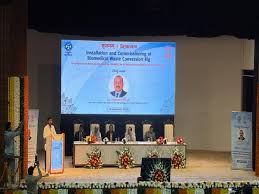
India has made significant progress in managing biomedical waste with the launch of ‘Srjanam’, the nation’s first automated system for converting biomedical waste, launched at AIIMS Delhi. On February 10, 2025, Union Minister for Science and Technology, Dr. Jitendra Singh, officially inaugurated this homegrown innovation. Created by CSIR-NIIST in Thiruvananthapuram, ‘Srjanam’ offers an eco-friendly and cost-effective solution compared to conventional biomedical waste disposal methods. The system is designed to mitigate environmental risks by eliminating the reliance on incineration, a common but polluting practice.
How Does ‘Srjanam’ Revolutionize Biomedical Waste Management?
India produces around 743 tonnes of biomedical waste each day, creating a major challenge for hospitals and medical facilities. Conventional disposal methods, particularly incineration, contribute to air pollution and various environmental risks. ‘Srjanam’ offers an eco-friendly solution by safely neutralizing hazardous biomedical waste like blood, urine, sputum, and lab disposables without depending on energy-heavy processes.
One of the unique aspects of ‘Srjanam’ is its ability to control foul odors, making waste disposal safer and more manageable. Unlike conventional systems, which often release harmful emissions, this automated system processes waste efficiently without external energy sources. AIIMS Delhi has become the first healthcare institution in India to install and implement this breakthrough technology.
What Are the Key Features of ‘Srjanam’?
- Automated Waste Neutralization – The system is designed to efficiently break down and neutralize hazardous biomedical waste. Unlike incinerators, which release harmful emissions, ‘Srjanam’ operates with a more environmentally friendly approach.
- Odor Control Technology – Managing foul-smelling toxic waste has been a persistent challenge in biomedical disposal. ‘Srjanam’ is equipped with a fragrance technology that neutralizes odors, making waste handling much safer and easier.
- Scalable Processing Capacity – Currently, the system can process up to 10 kg of biodegradable medical waste per day. Once necessary approvals are obtained, it is expected to scale up to 400 kg per day, ensuring its effectiveness for large-scale healthcare facilities.
What Does This Mean for India’s Healthcare System?
Dr. Jitendra Singh emphasized that the launch of ‘Srjanam’ aligns with India’s vision of “Viksit Bharat” by 2047. The government is actively supporting sustainable innovations that address environmental challenges while improving healthcare infrastructure. By implementing ‘Srjanam’ at AIIMS Delhi, the institution sets a precedent for other hospitals across India to adopt advanced waste management technologies.
Looking ahead, the success of ‘Srjanam’ at AIIMS Delhi could lead to its nationwide adoption. With proper approvals and funding, this system could become a benchmark for safe and sustainable biomedical waste disposal in India. The initiative not only protects the environment but also enhances safety standards in hospitals, ensuring better waste management practices for the future.
The launch of ‘Srjanam’ at AIIMS Delhi marks a significant step in India’s efforts towards sustainable healthcare. With its ability to handle biomedical waste efficiently and in an environmentally friendly manner, this innovation could pave the way for a cleaner and safer medical waste disposal system across the country.





